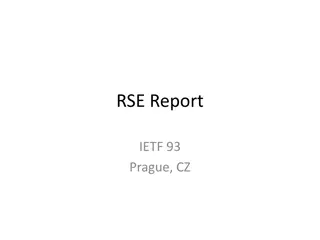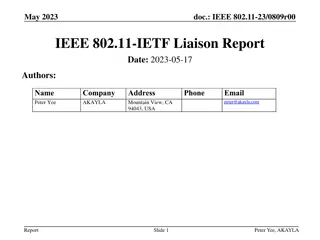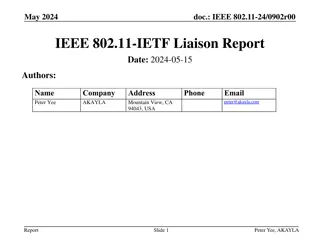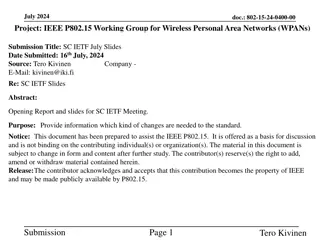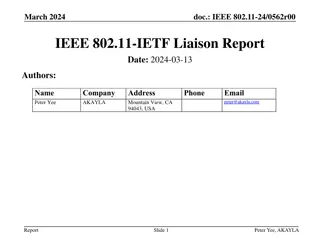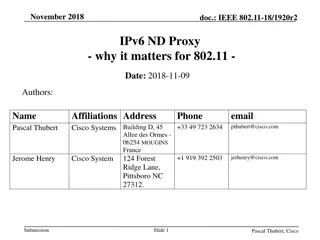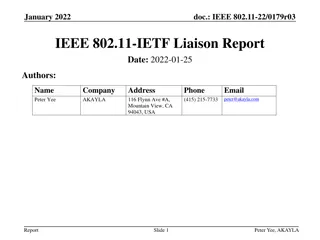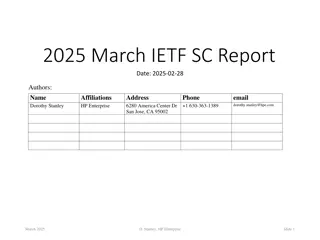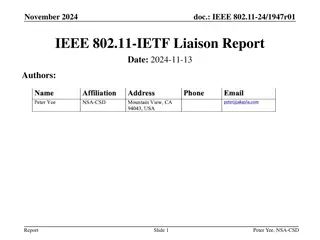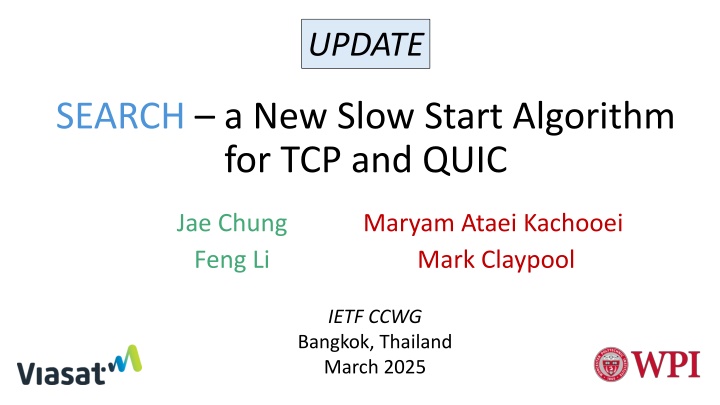
Innovative Slow Start Algorithms for TCP and QUIC Protocol Enhancement
This detailed content delves into the development of a new slow start algorithm for TCP and QUIC protocols, addressing packet loss, congestion, and round-trip time considerations. It introduces concepts like HyStart, delivered bytes-based strategies like BBR, and outlines the necessity for improved protocols in network management.
Uploaded on | 1 Views
Download Presentation

Please find below an Image/Link to download the presentation.
The content on the website is provided AS IS for your information and personal use only. It may not be sold, licensed, or shared on other websites without obtaining consent from the author. If you encounter any issues during the download, it is possible that the publisher has removed the file from their server.
You are allowed to download the files provided on this website for personal or commercial use, subject to the condition that they are used lawfully. All files are the property of their respective owners.
The content on the website is provided AS IS for your information and personal use only. It may not be sold, licensed, or shared on other websites without obtaining consent from the author.
E N D
Presentation Transcript
UPDATE SEARCH a New Slow Start Algorithm for TCP and QUIC Jae Chung Feng Li Maryam Ataei Kachooei Mark Claypool IETF CCWG Bangkok, Thailand March 2025
Packet loss TCP Slow Start Congestion Avoidance Slow Start Congestion Window Congestion window doubles each RTT Packet loss Exit slow start: Too late Idea: Exit after reaching capacity and before loss HyStart (Linux default) HyStart over wireless Too early (Before capacity) (After loss) Capacity Time Goal: At chokepoint: after capacity, before loss 2
SEARCH Concept difference threshold 0 t1 t2 t5 t3 t4 Round-trip time 3
SEARCH Algorithm curr_delv prev_delv 8a delivered bytes diff = 2 prev_delv curr delv capacity 4a normalized diff = diff / (2 prev_delv ) 2a a if (normalized diff threshold): t1 t2 t6 t3 t4 t5 round-trip time exit from slow start 4
Outline Introduction Place SEARCH in slow start space -Delay-based: HyStart, HyStart++ -Delivered Bytes-based: BBR, SEARCH Memory use delivered byte history Test framework Summary (done) (next) 4/15/2025 5
Cubic (without HyStart) 4/15/2025 6
RTT spikes exit SS Sensitive to RTT variation premature exit, underutilization -Bad in high BDP networks Delay-Based: HyStart 4/15/2025 7
Delay-Based: HyStart++ Recognizes that delay increase a noisy signal -Doesn t have better signal! Conservative Slow Start (CSS) -Slower growth -Check delay Delay goes down? -Yes back to SS -No go to CA CSS CSS CA While in CSS grow at slower rate than 2x If HyStart was wrong grow slower for some time If HyStart was right CSS pushes past capacity limit 4/15/2025 8
Delivered Bytes-Based: BBR Exits when delivery rate stops growing -3 consecutive rounds (RTTs), less than 25% -Decision each round When at capacity, RTTs increase rounds increase 4/15/2025 9
Delivered Bytes- Based: SEARCH Exits when delivered bytes increase less than 30% from previous RTT Decision each bin boundary (about RTT) Uses initial RTT, not current resilient to congestion delay 4/15/2025 10
4G LTE Same old story 4/15/2025 11
HyStart HyStart 4G LTE SEARCH BBR 4/15/2025 12
Outline Place SEARCH in slow start space -Delay-based: HyStart, HyStart++ -Delivered Bytes-based: BBR, SEARCH Memory use delivered byte history Test framework Summary (done) (next) 4/15/2025 13
s0 Memory Use for Delivered Bytes s1 BBR -Time when every segment sent -When segment delivered, compute delivery rate bytes delivered from sent to now / time -Storage overhead time size x cwnd size SEARCH -Sequence number each bin (~ RTT) -When bin ends, compute delivered seq now seq then -Storage overhead sequence x window t0 t1 t2 -. tN .. sN 100 Mb/s, 100 ms RTT = 83 total Window 10 + History 15 = 25 total 4/15/2025 14
Outline Place SEARCH in slow start space -Delay-based: HyStart, HyStart++ -Delivered Bytes-based: BBR, SEARCH Memory use delivered byte history Test framework Summary (done) (done) (next) 4/15/2025 15
Challenges: 1. Verify implementations of SEARCH 2. Compare performance for parameter tuning Kernel code (tcp_cubic_search.c) // SEARCH_defs_begin Source Code // SEARCH_defs_end // SEARCH_begin // SEARCH_end Code Extraction Setup Support Files search_defs.h search_mod.c tcp.h cc_helper_func.h test_search.c Input CSV file t1 s1 t2 s2 tn sn Output Log file Pass Pass Fail Pass Input csv Compilation & Execution Output file Client Server
Using the Framework Output Log file Pass Pass Fail Pass Verify and validate SEARCH implementations -Linux, versions -FreeBSD -QUIC Compare performance -Traditional, HyStart, SEARCH -BBR, HyStart++ Traces! -Normal, edge cases -WiFi, 4g/5g, GEO, LEO, Wired 4/15/2025 17
Summary https://search-ss.wpi.edu/ SEARCH -Determines choke point from expected delivered bytes -Exits slow start after congestion point, before loss Framework to verify implementations claypool@wpi.edu Looking for volunteers to try SEARCH! 4/15/2025 18
Thank-you for your attention! SEARCH a New Slow Start Algorithm for TCP and QUIC Jae Chung Feng Li Maryam Ataei Kachooei Mark Claypool IETF CCWG Bangkok, Thailand March 2025
References Improving TCP Slow Start Performance in Wireless Networks with SEARCH - IEEE World of Wireless, Mobile and Multimedia Networks (WoWMoM) - Perth, Australia, June 2024 Improving QUIC Slow Start Behavior in Wireless Networks with SEARCH - IEEE Local and Metropolitan Area Networks (LANMAN) - Boston, Massachusetts, USA, July 2024 Implementation of the SEARCH Slow Start Algorithm in the Linux Kernel - 0x18 NetDev Conference - Santa Clara, California, USA, July 2024 Reducing Per-flow Memory Use in TCP SEARCH - IEEE World of Wireless, Mobile and Multimedia Networks (WoWMoM) - Fort Worth, TX, USA, May 2025 4/15/2025 20
TCP Congestion Control Test Framework 1. ss_extract.py - Extracts Relevant Code - Usage:ss_extract.py -f original_file.c -k keyword - Functionality: Extracts slow start-related code using labeled sections (keyword_begin, keyword_end, keyword_defs.begin, keyword_defs.end). Generates three key files in test_dir: 1.keyword_modules.c 2.keyword_defs.h tcp.h (based on extracted modules)
TCP Congestion Control Test Framework 2. ss_setup.py - Sets Up Testing Environment - Usage:ss_setup.py -k keyword - Functionality: Determines the appropriate test file for the specified protocol. If a predefined test_keyword.c exists for the keyword (e.g., SEARCH, HyStart, BBR), it is placed in test_dir. If no predefined test file is available, test_base.c is provided for user modification. Places cc_helper_functions.h, which includes essential congestion control functions, in test_dir. Users can extend this file by extracting additional functions from the kernel if needed.
TCP Congestion Control Test Framework 3. ss_run.py - Executes the Tests - Usage:ss_run.py -k keyword -i input -o output - Functionality: Runs the test with specified input CSV files. Runs test_keyword: Reads the input CSV file with test parameters. Applies the congestion control logic. Outputs test results to output.txt.
Per-Flow Memory Use Cubic Cubic + HyStart Cubic + SEARCH (u8) BBR Cubic + SEARCH (u16) Cubic + SEARCH (u32)

